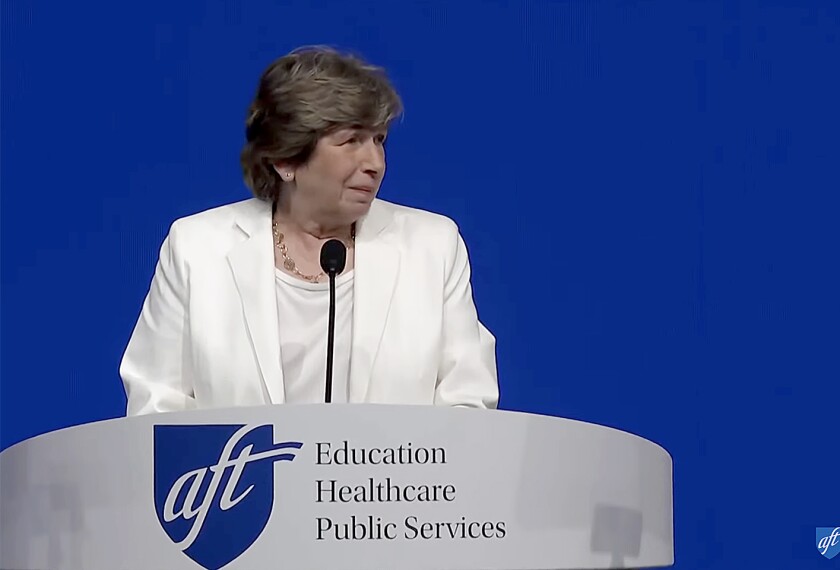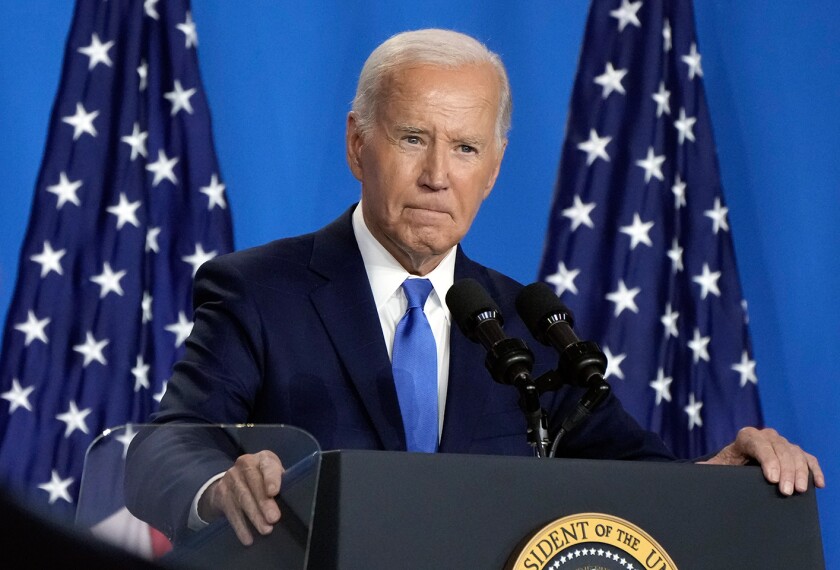State laws that allow teachers to carry guns are “dangerous” and could lead to “accidents and more tragedy,” the U.S. Secretary of Education told school and district leaders here during a wide-ranging onstage interview Wednesday.
Tennessee last week joined 33 other states that permit school staff members to carry guns, with administrator approval and some training.
“I’m all in favor of making sure we’re ensuring safety in our schools,” Cardona said during the EdWeek Leadership Symposium, an annual gathering of school and district leaders. “But this is not in my opinion a smart option.”
State lawmakers in favor of this approach argue arming teachers is necessary so school staff can intervene in active shooter situations before police arrive. But there’s little empirical research on the topic to help school leaders determine whether the strategy is effective.
Cardona raised questions about how the laws play out in practice.
Will the school building be considered less safe if the handful of armed teachers all happen to be out one day?
Will parents lobby school principals to place students only in classrooms with guns, or without them? Many states prohibit districts from disclosing publicly which teachers are armed.
And how will teachers squeeze in firearms training with all the other professional development on their plate?
“I want a teacher to meet the needs of that kid, not going to get trained on a [gun] range in their work time,” Cardona said.
States need to step up as ESSER runs out
Cardona addressed several topics Wednesday in conversation with Beth Frerking, Education Week’s editor-in-chief.
During the exchange, Cardona called on states to step up with more funding as the federal government steps aside after sending an unprecedented amount of aid to schools since 2020.
In March 2021, just two months into President Joe Biden’s term, Congress allocated $122 billion to help school districts recover from the effects of the COVID-19 pandemic. It was the third of three federal pandemic relief packages for schools totaling about $190 billion. The deadline for districts to commit the final round of those dollars to particular expenses is Sept. 30, roughly five months away.
Finance experts have projected a “fiscal cliff” for schools as federal emergency aid winds down.
But Cardona said he doesn’t like the term “cliff” because it implies a lack of alternatives.
He instead called on states to fill the hole ESSER’s absence will open with more robust investments in K-12 schools.
“We’re passing the baton back to states with urgency,” Cardona said.

That strategy may leave schools in some places with fewer resources in the coming years. States like Connecticut and Louisiana in recent months have pulled back on planned K-12 education investments as their fiscal outlooks for future years start to worsen.
Student aid problems have improved significantly, Cardona says
The last few months have been hectic for the federal agency Cardona oversees.
The long-awaited rollout of a new system for applying for federal financial aid for college that was supposed to simplify the process has been dominated by technical failures. The problems left thousands of students unable to complete their FAFSA forms and have pushed back colleges’ admissions timelines—and students’ college decisions—by several months.
The number of students who have completed a FAFSA form this year is significantly lower than normal, raising questions about the botched rollout’s long-term effects on this year’s graduating seniors.
The mess prompted the coming resignation of the agency’s top student loan official. And on May 1, West Virginia Gov. Jim Justice, a Republican, declared a state of emergency that allows student applicants to secure financial aid from the state without having to fill out federal financial aid forms first, as they’re typically required to do.
One of Cardona’s deputies had a call with Justice on May 2, Cardona said.
The FAFSA issue overall is “giving me a lot of gray hair,” he acknowledged. But he’s projecting confidence that the biggest kinks have been ironed out, and that colleges are now swiftly processing applications they receive from students.
“It’s been a challenge, but we didn’t sign up to do easy work,” Cardona said. “We signed up to change a broken system, and that’s what we’re doing.”
Another major issue on the Education Department’s agenda in recent weeks has been the release of revised Title IX rules that explicitly ban discrimination based on sexual orientation and gender identity at schools that receive federal money.
The new rule has drawn lawsuits from Republican-led states, and officials in some of those states have instructed schools not to comply.
Cardona did not address Title IX on Thursday.
Cardona could tackle privacy issues if Biden is re-elected
Cardona’s comments came six months before the 2024 presidential election, a rematch between Biden and former President Donald Trump.
Cardona told Politico last year he hopes to stay in his role if Biden wins a second term.
If he does, the department will likely be at the center of a long-running debate over how to strengthen the nation’s privacy laws to account for rapid advancements in technology, including tools used by students in schools. Cardona said he believes the updates should ensure there’s an “adult in the room” and “safeguards” to ensure children are protected from harm on the internet.
Wednesday’s event brought Cardona before a familiar audience. Before he was education secretary, Cardona was a teacher, principal, and state education chief in Connecticut.
Cardona met privately with EdWeek’s Leaders to Learn From honorees just prior to the onstage interview. Leaders to Learn From is an annual honor EdWeek offers to school district administrators who have demonstrated strong leadership qualities.








